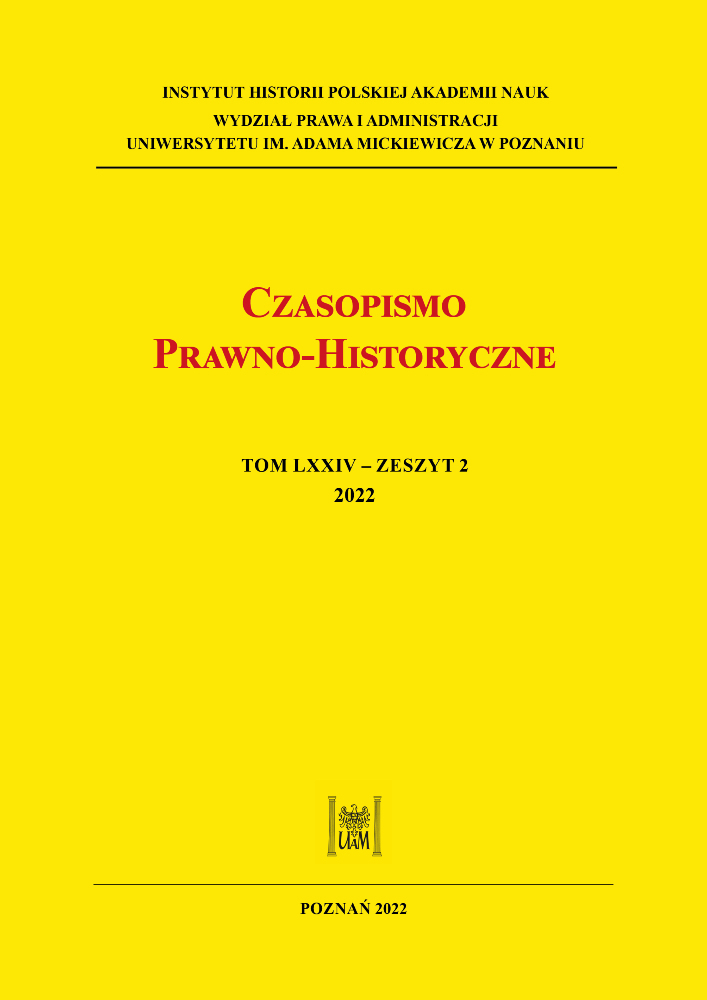Abstrakt
Artykuł przedstawia nowe i aktualne tłumaczenie praw Lipit-Esztara (ok. 1936-1926 p.n.e.) z języka sumeryjskiego na język polski. Lipit-Esztar był władcą I dynastii Isin, która rozpoczęła okres starobabiloński w historii starożytnej Mezopotamii. Jego prawa cechuje więc wiele podobieństw do praw Hammurabiego.
Bibliografia
Assante J., The kar.kid/ḫarimtu, Prostitute or Single Woman? A Reconsideration of the Evidence, „Ugarit-Forschungen” 1998, nr 30.
Beaulieu P.-A., A History of Babylon, 2200 BC-AD 75, Blackwell History of the Ancient World, Hoboken, NJ 2018. https://doi.org/10.1002/9781119257561 DOI: https://doi.org/10.1002/9781119257561
Black J. A., Cunningham G., Robson E., Zólyomi G., The Literature of Ancient Sumer, Oxford 2004.
Charpin D., Writing, Law, and Kingship in Old Babylonian Mesopotamia, Chicago 2010. https://doi.org/10.7208/chicago/9780226101590.001.0001 DOI: https://doi.org/10.7208/chicago/9780226101590.001.0001
Delnero P., Memorization and the Transmission of Sumerian Literary Compositions, „Journal of Near Eastern Studies” 2012, t. 71, nr 2. https://doi.org/10.1086/666645 DOI: https://doi.org/10.1086/666645
Frayne D., Old Babylonian Period (2003–1595 BC), The Royal Inscriptions of Mesopotamia Early Periods (RIME), t. 4, Toronto 1990. https://doi.org/10.3138/9781442678033 DOI: https://doi.org/10.3138/9781442678033
Kunderewicz C., Najstarsze prawa świata, Łódź 1972.
Lutz H. F., Selected Sumerian and Babylonian Texts, The University Museum Publications of the Babylonian Section, Philadelphia 1919. https://doi.org/10.9783/9781512817737 DOI: https://doi.org/10.9783/9781512817737
Michalowski P., History as Charter Some Observations on the Sumerian King List, „Journal of the American Oriental Society” 1983, t. 103, nr 1. https://doi.org/10.2307/601880 DOI: https://doi.org/10.2307/601880
Michalowski P., The Lamentation over the Destruction of Sumer and Ur, Mesopotamian Civilizations, t. 1, Winona Lake, IN 1989.
Mikołajczak T., Prawa Ur-Nammy, „Czasopismo Prawno-Historyczne” 2021, t. 73, z. 2. https://doi.org/10.14746/cph.2021.2.1 DOI: https://doi.org/10.14746/cph.2021.2.1
Molina M., La ley más antigua: textos legales sumerios, Madrid 2000.
Robson E., Ohgama N., Scribal Schooling in Old Babylonian Kish: the Evidence of the Oxford Tablets [w:] H. D. Baker, E. Robson, G. Zólyomi (red.), Your Praise is Sweet: A Memorial Volume for Jeremy Black from Students, Colleagues and Friends, London 2010.
Roth M. T., Law Collections from Mesopotamia and Asia Minor, Writings from the Ancient World, Atlanta, GA 1995.
Sallaberger W., Der ‘Prolog’ des Codex Lipit-Eštar [w:] „Gerechtigkeit und Recht zu üben” (Gen 18, 19): Studien zur altorientalischen und biblischen Rechtsgeschichte, zur Religionsgeschichte Israels und zur Religionssoziologie. Festschrift für Eckart Otto zum 65. Geburtstag, Wiesbaden 2009.
Sigrist M., Lipit-Ištar [w:] E. Ebeling, B. Meissner (red.), Reallexikon der Assyriologie und Vorderasiatischen Archäologie, t. VII: Libanukšabaš-Medizin, Berlin 1990.
Steele F. R., The Code of Lipit-Ishtar, „American Journal of Archaeology” 1948, t. 52, nr 3. https://doi.org/10.2307/500438 DOI: https://doi.org/10.2307/500438
Wilcke C., Gesetze in sumerischer Sprache [w:] N. Koslova, E. Vizirova, G. Zólyomi (red.), Studies in Sumerian Language and Literature: Festschrift für Joachim Krecher, Winona Lake, IN 2015. https://doi.org/10.1515/9781575063553-019 DOI: https://doi.org/10.1515/9781575063553-019
Licencja
Prawa autorskie (c) 2022 Tytus Mikołajczak

Utwór dostępny jest na licencji Creative Commons Uznanie autorstwa – Na tych samych warunkach 4.0 Miedzynarodowe.





